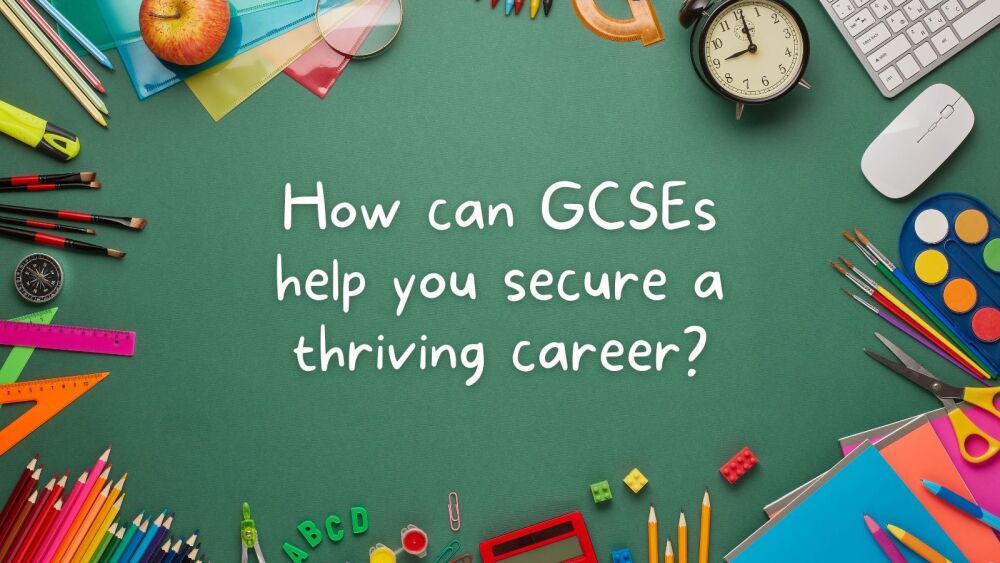How can GCSEs help you secure a thriving career?
Posted on
Although studied between the ages of 14-16, GCSEs can help young people secure a fantastic career once they have left school.
The most obvious route to a successful career after GCSEs is to continue in education, securing A Levels and then a degree.
Many would argue that GCSEs aren’t actually that important, which might be true if you have worked your way up the ladder for the past 20 years, contributing to a fantastic CV and connections in the industry.
However, for those who are applying for their first job, their education is crucial. Most employers would expect their younger candidates to have good maths and English GCSEs.

What are GCSEs and why are they important?
GCSEs are subject-based academic qualifications and are graded using the 9-1 scheme, 9 being the highest grade (the equivalent of an A*). If you wish to progress in your learning career by going to college, sixth form or university, then it’s important to do well in your GCSEs.
The entry requirements for different sixth forms vary, but it’s great to have a general range of excellent GCSE grades to help students naturally progress to their A Levels. No matter whether you're looking for private schools in Leicester or sixth form colleges in Leeds after your GCSEs, you will need certain grades to progress to this next level of study. You'll be able to search admission and grade requirements on most school websites, or contact them to find out.
Universities will also look at an applicant’s GCSE grades, so this is another reason to do your best in your GCSEs.
GCSEs usually consist of both coursework and exams for each subject. The coursework may be an essay and although it sounds scary, there is lots of essays help online and it's perhaps easier than ever to learn now with a wealth of information at your fingertips on the internet.
If you're considering taking GCSEs and want to prepare effectively, explore available resources such as online access to GCSEs through Distance Learning Centre. This can provide comprehensive support for both coursework and exam preparation, ensuring you have the necessary tools to excel in your studies.
Does your dream job require GCSEs?
Those who have a dream job in mind would be wise to do some research and find out what qualifications are required.
Doctors, for instance, will need a five-year degree in medicine and to get onto a medical course, students will need A Levels in Chemistry, Biology and either Maths or Physics.
However, it’s absolutely possible to get a well-paying, fulfilling job with decent GCSEs, without studying A Levels or going to university, including roles involved in things like accountancy, social care or engineering. Retail also attracts many school leavers and offers much room for progression.
If your job requires further education then you will need good GCSE grades to secure your place on the course you require whilst working towards your career goals.
Your options if you don’t want to study past your GCSEs
In the UK, students can only leave school at the age of 16 if they enrol in a learning or training programme until they are 18.
Apprenticeships and traineeships are great for young people who prefer to learn the tricks of the trade in a hands-on environment, rather than through academia.
They often allow young people to earn while they learn, while also building relationships with people in the industry who may be able to support them in the future.
The fact that GCSEs alone can help people find employment in a successful field is also good news for adults who are hoping for a change in career, but don’t want to go through years of schooling or face the fees that come along with that.
Final word on the importance of GCSEs for your career
When it comes to GCSEs and your career, they are important. To secure your first job role, many employers will require proof of GCSEs, perhaps most important in maths and English. If you require a career that needs further education then your GCSEs will be required to meet entry requirements for the college or sixth form.
Best of luck!
Related blog posts:
My ongoing learning and career plan
Why you should never stop learning
How to develop a magnetic personality
The importance of learning in your life and career
Why digital marketing skills are essential today
The best career pathways for social butterflies
How learning a foreign language can increase your career opportunities
5 ways to make money online if you love to teach others

